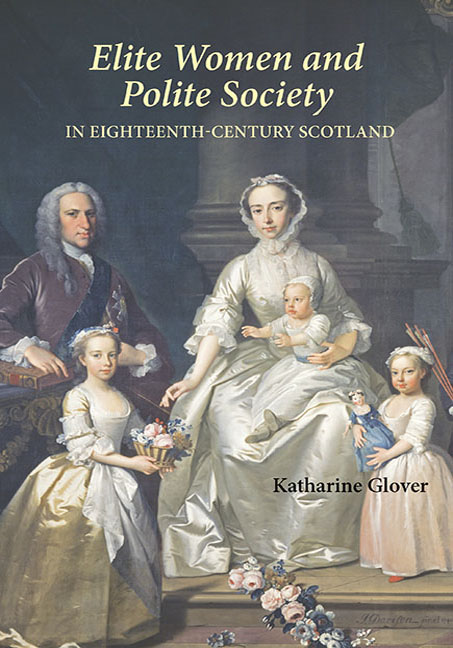Book contents
- Frontmatter
- Contenst
- Dedication
- Acknowledgements
- List of Abbreviations
- Preface
- 1 Elite Women and Eighteenth-Century Scottish Society
- 2 Education and Upbringing
- 3 Reading and Print Culture
- 4 Polite Sociability: Space and Social Practices
- 5 Politics and Influence
- 6 Travel, Tourism and Place
- Conclusion
- Appendix Biographical Backgrounds
- Bibliography
- Index
4 - Polite Sociability: Space and Social Practices
Published online by Cambridge University Press: 08 April 2017
- Frontmatter
- Contenst
- Dedication
- Acknowledgements
- List of Abbreviations
- Preface
- 1 Elite Women and Eighteenth-Century Scottish Society
- 2 Education and Upbringing
- 3 Reading and Print Culture
- 4 Polite Sociability: Space and Social Practices
- 5 Politics and Influence
- 6 Travel, Tourism and Place
- Conclusion
- Appendix Biographical Backgrounds
- Bibliography
- Index
Summary
‘Both useful & amusing’
Sociability, as previous chapters have demonstrated, was a key preoccupation of the polite. Chapter 1 introduced the ideological importance placed by the polite on elite women's participation in heterosocial activities; Chapter 2 demonstrated the centrality of the preparation for this role in the upbringing of young girls; and Chapter 3 examined the potential for reading to cement social relationships. This chapter asks how polite sociability was acted out in practice by elite women in eighteenth-century Scotland, and how polite social practices and the spaces with which they were associated influenced the experience of elite femininity in that society. As the first chapter explained, participation in a series of social activities including dancing assemblies, balls, plays, concerts of music or visits for tea was about far more than merely entertainment for the eighteenth-century British elite. Rather, they believed that by socialising together in such spaces (often public, always to some degree regulated) men and women would lose any awkwardness or ungainly manners, and instead acquire through observation and imitation the easy, refined behaviour that defined the polite. So, when Robert Adam departed for Italy in 1754, he advised his sisters that ‘As diversions cannot [bu]t be both useful & amusing I insist you decline none of them.’ Acknowledging the amusement that such activities might provide for his sisters, Adam, ambitious as he was, was well aware of their potential ‘usefulness’ in presenting his sisters with the opportunity to be seen in society, to show off their polite accomplishments, and to forge social connections which could be advantageous to him in his future career. As this example demonstrates, women's participation in polite sociability was encouraged not necessarily because of any perceived benefits for the women themselves. But from ideas about the improving properties of the company and conversation of elite women, and about the companionable role enjoyed by women in the most civilised societies, there emerged a very real change in patterns of sociability, the impact of which had a transformative effect on the lives of elite women.
The sociability of preceding generations of elite Scots had been located primarily in the rural context, centred on the country house and the provision of lavish hospitality to the regular streams of visitors they received.
- Type
- Chapter
- Information
- Publisher: Boydell & BrewerPrint publication year: 2011

